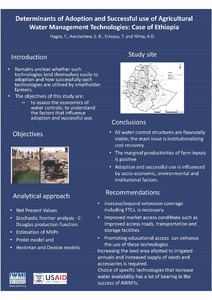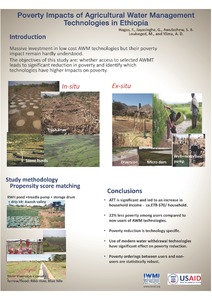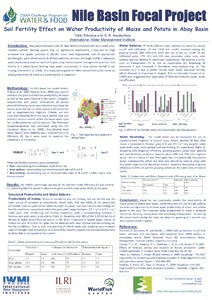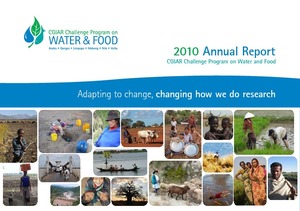Impact of abstractions upstream on the benefits of riverine water discharge into the Lorian swamps, Kenya
Livestock development for better water use in the Nile Basin
Poverty impacts of agricultural water management technologies in Ethiopia
Soil fertility effect on water productivity of maize and potato in Abay Basin
Inadequate access to safe water for livestock and people in Ethiopian rural settings: Implications for health
CPWF Annual Report 2010: Adapting to change, changing how we do research
The CPWF 2010 Annual report is out. It describes the major achievements of CPWF over?the year 2010. It also provides a number of stories and lessons learned from the basin development research programs.
Learning from the past: Rainwater management in smallholder crop-livestock systems of the Volta basin
Middle East Water and Livelihoods Initiative (WLI)
This will ensure more sustainable ecosystems and improved rural livelihoods. Emphasis is given to building on local knowledge by using existing data, social capital, research linkages, partnerships and proven methodologies and technologies in the region thereby ensuring the sustainability of the impacts achieved. The Initiative also draws from a wide pool of multi-disciplinary expertise from within and outside the region and targets the three major agro-ecosystems in the region – rainfed, irrigated and rangeland.
The development of key national policies with respect to rainwater management in Ethiopia: A review
Several national economic and sectoral policies and strategies were developed, adopted
and being implemented over the last couple of decades in Ethiopia. These policies and
strategies provide frameworks and guides for economic management in a wide range of
aspects. There are policies that support and lay a good ground for the development and
implementation of RWM interventions. These policies are general like the ones that affect
the agricultural sectoral development and specific ones that are important for water sector,
La Cooperation entre La FAO et le Royaume du Maroc
Le Maroc qui dispose de ressources appréciables en sols, eau et forêts a décidé, dès son indépendance en 1956, de faire de l’agriculture, l’un des piliers de son développement. Il a également su mettre à profit sa double façade atlantique et méditerranéenne, qui recèle un important potentiel halieutique, pour assurer au secteur des pêches un élan de développement durable. De tels choix ont créé une dynamique de croissance économique régulière qui a permis d’assurer la sécurité alimentaire du peuple marocain.









